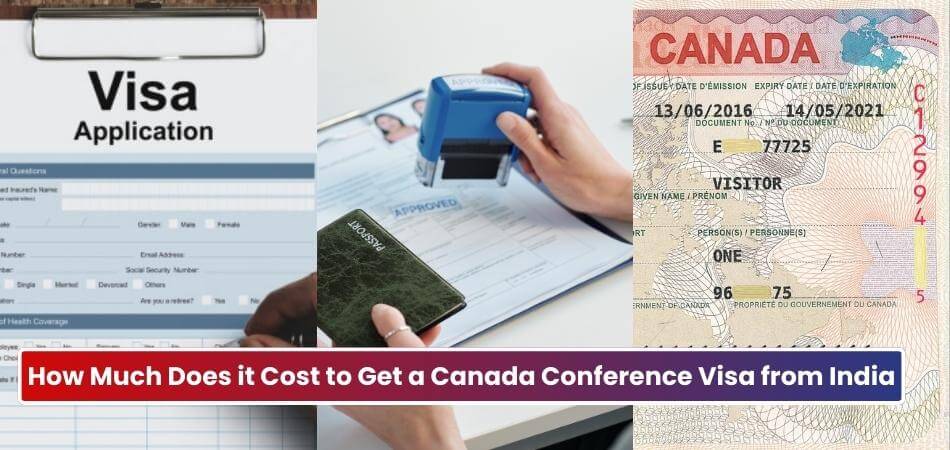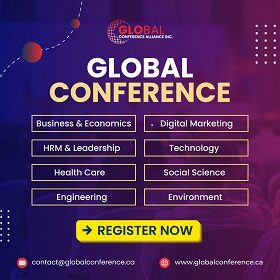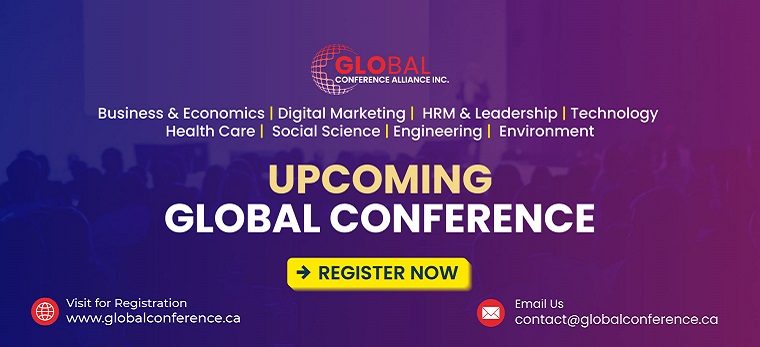Are you planning to attend a conference in Canada from India? While the prospect of networking and gaining valuable insights is exciting, it’s crucial to understand the financial aspect of obtaining a Canada Conference Visa. The cost of securing this visa can be a significant factor in your travel plans. So, how much does it cost to get a Canada Conference Visa from India?
The initial fee for this visa typically falls between CAD $100 to CAD $150. However, this isn’t the end of the story. Alongside the base price, applicants should be prepared for additional charges related to services like biometrics, express processing, or courier fees. These can vary greatly based on individual needs and circumstances.
For a detailed breakdown and more insider tips on the application process, dive deeper into this blog and learn how to navigate these charges and make your journey smooth.
What is the Purpose of a Conference Visa?
A conference visa serves as an entry pass for foreign nationals intending to attend events in another country. Specifically tailored for those participating in conferences, seminars, or workshops, this visa ensures streamlined entry. While each country has its nuances, the underlying motive remains to facilitate short-term visits for knowledge exchange and professional networking.

Being granted a conference visa indicates that the participant has legitimate reasons for their travel. It reassures the hosting country that the traveler’s intent matches the stated purpose, thereby minimizing overstaying risks. Moreover, it helps in organizing events, as organizers can gauge international participation and manage logistics more effectively.
From an attendee’s perspective, the visa simplifies travel preparations. Armed with a conference visa, attendees can focus on the event, their contributions, and maximizing learning opportunities. Additionally, it often expedites the immigration process, making the overall travel experience smoother and more enjoyable.
Types of Canadian Conference Visas for Indian Citizens
Canada, known for its diverse culture and top-tier events, often attracts professionals and students from India for various conferences. Differentiating between the types of conference visas is essential for a hassle-free application process. Here are the types of Canadian conference visas available for Indian citizens:
Business Visitor Visa
This visa type caters specifically to professionals from India traveling for business conferences, conventions, or trade meetings in Canada. Valid for a short duration, usually up to six months, it ensures the visitor sticks to business-related activities. Work is not permitted, emphasizing the pure business intent of the trip.
Temporary Resident Visa (TRV)
The TRV is a multipurpose visa, encompassing reasons ranging from tourism to attending conferences. When Indian citizens apply with the intent to join a conference, they must clearly indicate the event details. This specificity helps in expedited processing and accurate visa categorization.
eTA (Electronic Travel Authorization)
For Indian citizens who are transiting through Canada or have a visa-exempt status, the eTA becomes necessary. This electronic document is crucial for air travel but doesn’t replace a conference visa. It simply complements the primary visa when needed.
Study or Training Conference Visa
This category focuses on academic and training events. Indian students or professionals seeking short-term courses, workshops, or seminars in Canada can apply for this visa. It’s a confluence of academia and professional growth, facilitating dynamic learning experiences.
Special Events Visa
Occasionally, Canada hosts grand international events or conferences that garner global attention. For such events, special visas might be introduced to facilitate international participation. Indian delegates should stay updated about such visas when considering attendance at major events.
Diplomatic and Official Visas
Reserved for dignitaries and governmental officials, this visa type ensures a streamlined process for Indian representatives attending conferences in Canada. Whether they’re part of bilateral talks or international conferences, this visa underscores the importance of diplomatic relations.
Knowing which visa type aligns with one’s purpose of visit can make the journey from India to Canada smooth. Proper research and documentation can ensure that the conference experience memorable is both enriching and hassle-free.
How Much Does it Cost to Get a Canada Conference Visa from India?
Canada beckons professionals and academics worldwide with its top-tier conferences and seminars. If you’re from India, you might wonder: How Much Does it Cost to Get a Canada Conference Visa from India? Getting clarity on the costs is your first step toward successful participation.

Base Application Fee
For most conference-goers, the starting cost revolves around the application fee. This fundamental charge usually hovers between CAD $100 and $150. It’s the foundation upon which other costs get added. Keep in mind, this is the base fee, without additional services.
Biometrics Charges
Biometrics play an integral role in visa processing. For Indian citizens, a separate charge applies for this service. Typically, you might incur around CAD $85 for biometrics. Remember, this ensures secure and streamlined entry into Canada.
Expedited Processing Fee
Sometimes, urgency demands faster visa processing. For those in a hurry, Canada offers expedited services at an extra fee. While this can vary, it’s essential to factor in this potential cost. Quicker processing might be pricier but saves valuable time.
Agent or Consultancy Fees
Many opt for expert guidance when applying. Visa consultancies or agents, familiar with the process, charge for their services. Their fees differ based on reputation and success rate. It’s an investment for a hassle-free application experience.
Supplementary Service Charges
Apart from primary fees, there are additional services. These can range from courier fees to document translation or verification. Each service incurs its respective charge, adding to the overall cost. Carefully consider these when budgeting for your visa.
Potential Re-application Fees
In unfortunate scenarios where a visa gets denied, re-application becomes necessary. This means shelling out the application fee once again. It’s not just a financial setback but also demands more time. Therefore, thorough initial applications are crucial.
Understanding the financial implications of obtaining a Canada Conference Visa from India is crucial. By breaking down each cost component, applicants can ensure a smoother, more informed process.
How to Minimize Expenses When Applying for a Conference Visa?
Applying for a conference visa can be a costly affair, but with strategic planning, expenses can be curtailed and you can increase the success rate of getting a visa. Knowing where and how to save can make a significant difference to your wallet. Here’s a guide to economizing during the application process.

Step-1. Research and Self-Application
Start by comprehensively researching visa requirements and processes. Knowledge empowers you to apply independently, without relying on agents. While consultants offer expertise, their services come at a price. By self-applying, you eliminate consultancy fees, bringing down costs.
Step-2. Use Online Platforms
Most countries, including Canada, offer online platforms for visa applications. Online applications often reduce or eliminate courier and postage fees. Moreover, these platforms are user-friendly, guiding applicants through each step. It’s a win-win, both cost-effective and convenient.
Step-3. Avoid Expedited Services
Expedited or express services attract additional fees. While they ensure quicker processing, they’re pricier. It’s advisable to apply well in advance, giving ample time for regular processing. Timely applications negate the need for rush fees, cutting down expenses.
Step-4. Group Applications
If you’re attending a conference with colleagues, consider group applications. Some embassies or consulates offer discounts or streamlined processes for groups. Not only can this save money, but it often simplifies paperwork, saving time as well.
Step-5. Limit Supplementary Services
While additional services like document translation or verification can be helpful, they come at a cost. Evaluate if they’re truly necessary for your application. Handle as much as you can independently and only opt for services that are absolutely essential.
Step-6. Double-check All Information
Rejections can lead to re-application and double the fees. Ensure that all details in your application are accurate to avoid this setback. A careful review, perhaps even a second opinion, ensures everything is in order. A thorough check minimizes the risk of unforeseen expenses due to errors.
By following these steps, visa applicants can significantly reduce the financial strain of the application process. Remember, informed and proactive measures are your best allies when looking to save. The savings accrued can then be utilized during the conference or for other productive endeavors.
Tips for a Hassle-free Conference Visa Application
Acquiring a conference visa is a pivotal step for international attendees. The application process might seem daunting, but with the right approach, it can be streamlined. Here are ten tips to ensure a smooth, hassle-free visa application.
- Early Application: Start the application process well in advance. This gives ample time for any unexpected delays. It also eliminates the need for pricier expedited services.
- Comprehensive Documentation: Gather all necessary documents before starting. Missing paperwork can delay processing. Ensure everything is current, valid, and meets embassy specifications.
- Double-check Details: Meticulously review your application for accuracy. Any discrepancies can lead to rejections. A second review by someone else can catch overlooked errors.
- Use Online Portals: Most countries offer online visa application systems. They’re user-friendly and guide applicants step by step. Online systems often expedite processing, saving time.
- Seek Guidance if Unsure: If in doubt, seek advice. Many official embassy websites have FAQs or helplines. It’s better to clarify doubts than make avoidable mistakes.
- Show Financial Stability: For visa approvals, demonstrate financial capability. This assures you can support yourself during the conference. Bank statements or sponsorship letters can serve this purpose.
- Have a Clear Itinerary: Show clear travel plans, including conference details. This demonstrates purpose and intent. An itinerary can include conference registration, travel, and accommodation details.
- Be Ready for Biometrics: Some countries require biometric data collection. Know where and when to give this data. It’s usually a quick process but is crucial for the application.
- Maintain Communication Channels: Provide accurate contact information. Embassies might need additional details or clarifications. Prompt responses can expedite the application process.
- Prepare for Interviews: Some visa processes involve interviews. Be ready with all pertinent information. Confidence and clarity during this stage can positively influence the outcome.
Getting a conference visa requires attention to detail and preparation. By adhering to these tips, applicants can navigate the process with reduced stress, ensuring they’re well on their way to attending their desired event.
Conclusion
Embarking on a journey to a foreign conference involves much more than just packing a bag and boarding a plane. A central concern for many is deciphering “How Much Does it Cost to Get a Canada Conference Visa from India?” This isn’t just about the base fee, which usually lies between CAD $100 to $150; it also encompasses potential additional charges. Biometrics, express processing, and consultancy services, to name a few, can add to your expenditure.
However, with the right guidance and insight, applicants can navigate this process with ease and clarity. It’s essential to be well-informed, not just for budgeting purposes but also to ensure a smooth visa application process. Knowledge is power, and having a clear understanding of the costs and procedures can save both time and money.
In conclusion, attending conferences in Canada is an exciting prospect for many Indian professionals and academics. By taking a proactive approach, ensuring timely applications, and staying informed about the various expenses, one can have a hassle-free experience. After all, the goal is to focus on the conference and the opportunities it presents, not to get bogged down by visa intricacies.





